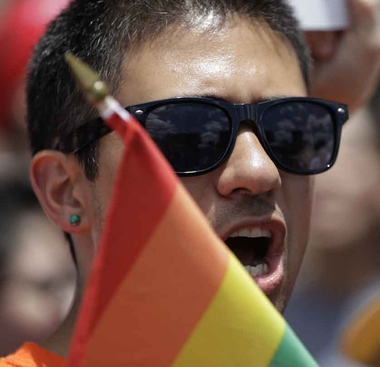Will the Equality Act change life for LGBTQ+ Americans in today's political climate?

ANALYSIS
by Brandon Tensley, CNN
As the country trains its gaze on the 2020 presidential election, for LGBTQ Americans, there are similarly important political contests to keep an eye on: next year's Senate elections.
That's because, in May, the Democrat-led House of Representatives passed the Equality Act, an expansive bill that would protect against anti-LGBTQ discrimination in all aspects of commercial and public life. If the Democrats retain the House and win the Senate in 2020, many expect that they would have the votes to send the measure to the President's desk.
CNN is set to host an LGBTQ town hall with 2020 Democratic presidential candidates, where the Equality Act is sure to be discussed, airing on Thursday from 7:30 p.m. to 12 a.m. ET.
The substantive value of the Equality Act isn't tough to understand. It would, without religious exemption, "prohibit discrimination on the basis of sex, gender identity, and sexual orientation," including in regards to employment, housing, and private and public services. (Notably, the Supreme Court is grappling with a comparable set of issues this week.)
But the legislation feels all the more powerful in light of its broader messaging potential: If it gains enough support in Congress, its explicit affirmation of LGBTQ rights and the lives they protect could help to fundamentally change the character of how America has traditionally portrayed LGBTQ people.
Recall the ways various governments and institutions have historically vilified queerness. The mid-century "lavender scare," championed by then-Sen. Joseph McCarthy, set off purges of thousands of gay men and women from the national security apparatus. A 1953 executive order from then-President Dwight D. Eisenhower instructed federal agencies to investigate employees who might pose risks to their work (and to the country); this included people suspected of "sexual perversion" -- aka of being homosexual -- which could get you fired.
In the '60s, many states began to embrace narrower interpretations of anti-sodomy laws, turning to these colonial artifacts to corset gay people's public and private lives -- to criminalize them for allegedly going "against nature" -- as the American Civil Liberties Union and UCLA School of Law-based Williams Institute explain. (It wasn't until the landmark 2003 case Lawrence v. Texas that the Supreme Court struck down the country's remaining anti-sodomy laws, though there have been documented instances of this harassment persisting in some states.)
Today, an argument conservatives commonly invoke to disavow LGBTQ rights is that of religious conscience -- that is, enshrining these rights would conflict with their religious beliefs and liberties. Vendors who don't want to support same-sex wedding ceremonies have been at the center of this controversy. But in August, the Trump administration proposed a rule to allow certain federal contractors to hire and fire according to their religious views -- a move that may well open up additional avenues for discriminating against LGBTQ people.
These are just a few examples that illustrate how, through the work of time, a punishing alchemy of public policy and cultural mores has made queerness proximate to repulsiveness, to something that must be reined in: It's criminal. It's deviant. It's sinful. (And it was only in 1973 that the American Psychiatric Association -- the world's largest psychiatric organization -- declassified homosexuality as a mental illness.)
The Equality Act, then, could provide -- fully, uncompromisingly and on a national scale -- a corrective soft lighting to identities that shouldn't have been disparaged to begin with.
This isn't to suggest that a single bill would end discrimination that, over decades and centuries, has latched onto America. Neither is it to overplay the messaging aspect of a bill that would give LGBTQ people tangible recourse if their basic rights are violated -- if, say, they're refused a rental lease because of their gender identity or sexual orientation.
Rather, it's to take stock of the wider possibility of the Equality Act. As attention turns more earnestly toward election season, there's promise in the paradox that a country that has for so long legislated against LGBTQ Americans just might use that same power to better their lives -- and also help to scotch the narratives that have ostracized them for their differences.
Analysis by Brandon Tensley, CNN via The-CNN-Wire™ & © 2019 Cable News Network, Inc., a Time Warner Company. All rights reserved.
The Gayly. 10/09/2019 @ 2:02 p.m. CST.





